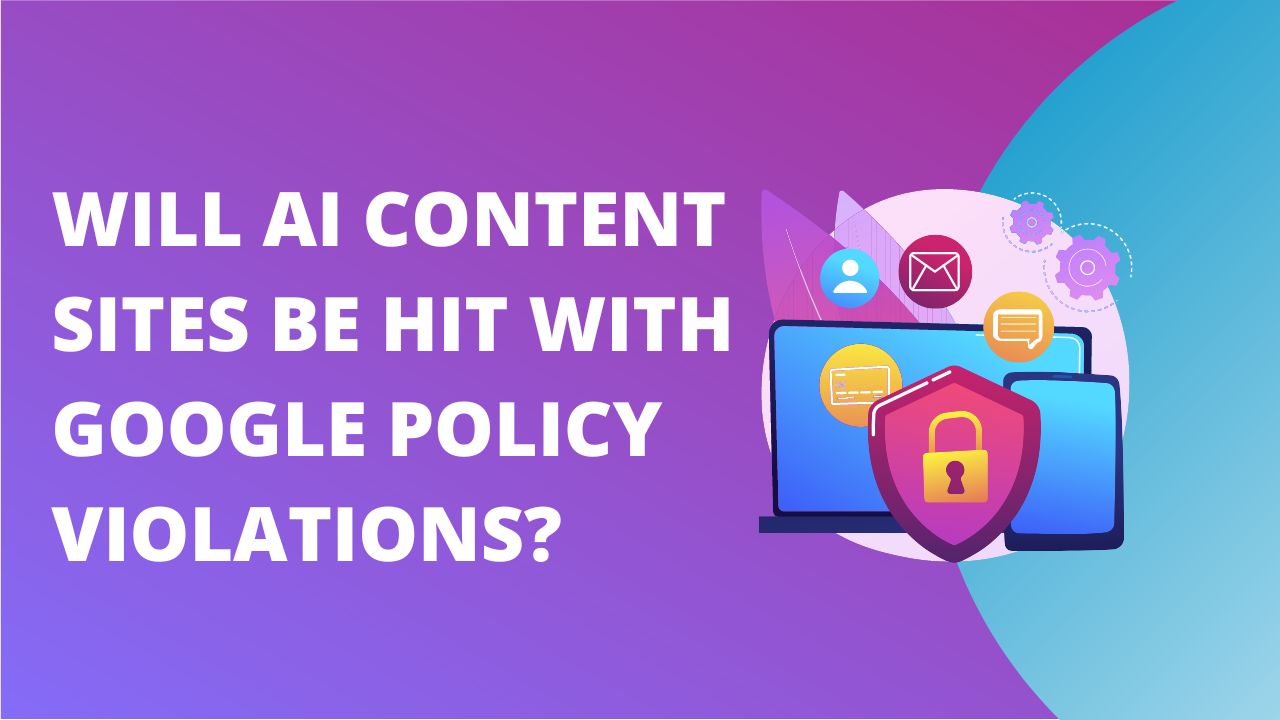
ChatGPT and other AI tools have transformed the publishing landscape, enabling publishers to generate vast amounts of content efficiently and cost-effectively. While AI content sites offer numerous benefits, they also raise concerns about compliance with Google’s stringent policies.
This article will delve into AI content sites’ potential challenges with Google policy violations and provide valuable insights for publishers to navigate this complex terrain while maintaining violation-free practices.
Google’s content policies greatly emphasize delivering users high-quality, valuable, and original content. Publishers using AI content sites must ensure that the AI-generated articles meet the same standard. While AI can efficiently create content, reviewing and editing the output is crucial to avoid potential policy violations stemming from low-quality, repetitive, or plagiarized content. This is why it is important to implement a robust content review process to uphold content quality and ensure that AI-generated articles provide unique insights and value to readers.

Keyword stuffing is a practice in which content creators excessively use specific keywords or phrases to manipulate search engine rankings artificially. The primary intention behind keyword stuffing is to make the content appear more relevant to certain search queries, hoping to rank higher in search engine results pages (SERPs). However, this technique is considered a black-hat SEO practice and is against Google’s Webmaster Guidelines.
AI content platforms, while efficiently generating vast amounts of content, can inadvertently fall into the keyword-stuffing trap if not appropriately managed. Since AI algorithms may not completely understand search engine guidelines, they may produce content that excessively repeats targeted keywords to an unnatural extent.
AI-generated content is more susceptible to keyword stuffing due to its automated nature. It may lack the human intuition required to recognize the limits of acceptable keyword usage and context. The focus on high-volume content production could lead to compromised content quality and reduced user experience.
AI-generated content has the potential to produce duplicate or plagiarized content from existing sources, which can harm a website’s SEO rankings. Google’s algorithms are adept at detecting such instances, and violations may result in significant penalties.
Google takes the issue of duplicate or plagiarized content very seriously, as it undermines the user experience by presenting redundant or unoriginal information. AI content sites that consistently produce duplicate or plagiarized content may face severe policy violations that can lead to penalties, and in extreme cases, get their websites banned from Google’s search results. Here are the specific policy violations related to duplicate or plagiarized content that can result in penalties or a ban:
To avoid these policy violations and penalties, publishers using AI content sites must prioritize originality and ensure that AI-generated content is not duplicated from other sources without proper attribution or permission. Implementing robust plagiarism checks and human editorial oversight can help prevent accidental policy violations related to duplicate or plagiarized content. Additionally, promoting a culture of ethical content creation and respecting copyright laws will safeguard publishers from running afoul of Google’s policies and ensure a positive user experience on their websites.
User experience is a core factor in Google’s evaluation of website quality. Websites featuring AI-generated content must ensure that the content aligns with user expectations, interests, and intent, as poor user engagement can negatively impact search rankings.
Tip for Publishers: Regularly monitor user metrics and feedback to identify areas for improvement and fine-tune AI-generated content to cater to the preferences and needs of the target audience.
| Factors to Consider for User Experience in AI Content Sites | More Info. |
|---|---|
| 1. Content Relevance | Ensure content aligns with audience interests and needs. |
| 2. Readability and Clarity | Use clear language and formatting for easy comprehension. |
| 3. Page Load Speed | Optimize loading speed to reduce bounce rates. |
| 4. Mobile-Friendly Design | Ensure a responsive design for various devices. |
| 5. Intuitive Navigation | Design clear menus and search functionality. |
| 6. Minimize Intrusive Ads | Display relevant and non-intrusive ads. |
| 7. Accessibility | Cater to users with disabilities following WCAG guidelines. |
| 8. Engaging Multimedia | Use images, videos, and infographics to enhance content. |
| 9. Credibility and Trustworthiness | Attribute sources and provide author information. |
| 10. Error Handling | Implement user-friendly error messages and forms. |
| 11. Consistent Branding | Maintain a uniform branding identity. |
| 12. User Feedback Mechanisms | Encourage comments, ratings, and surveys for feedback. |
| 13. Social Sharing and Engagement | Include social sharing buttons and interact with users. |
| 14. Personalization | Offer content recommendations based on user preferences. |
| 15. Optimize for Voice Search | Address voice search queries with natural language. |

With the growing influence of AI in content creation, publishers must be transparent about using AI content sites. Users and search engines value transparency, and failure to disclose AI involvement may lead to losing trust and credibility. Communicate the role of AI in content creation through website disclaimers or dedicated sections, fostering trust and building credibility with readers and search engines.
Website disclaimers can vary based on the specific use of AI in content creation and the nature of the website. Below are some examples of website disclaimers that emphasize transparency regarding the use of AI-generated content:
As AI revolutionizes content creation, publishers must adhere to Google’s content policies to avoid potential violations and penalties. Striking the right balance between AI-driven efficiency and compliance with Google’s policies will ensure publishers stay ahead in the dynamic landscape of AI-powered content creation.
Don’t miss this exclusive opportunity to access free advanced video training on Google Policy Violations. Empower yourself with the knowledge and expertise needed to ensure your website complies with Google’s guidelines while maximizing revenue and providing a top-notch user experience. Register now and gain valuable insights from industry experts at MonetizeMore to stay ahead in the ever-evolving digital landscape. Take the first step towards a successful and policy-compliant online presence by signing up for this training today!

With over ten years at the forefront of programmatic advertising, Aleesha Jacob is a renowned Ad-Tech expert, blending innovative strategies with cutting-edge technology. Her insights have reshaped programmatic advertising, leading to groundbreaking campaigns and 10X ROI increases for publishers and global brands. She believes in setting new standards in dynamic ad targeting and optimization.
10X your ad revenue with our award-winning solutions.